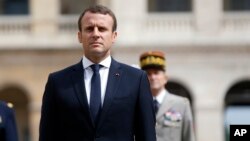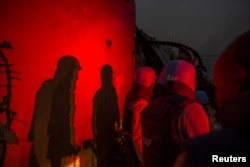President Emmanuel Macron heads to Mali on Sunday to throw France's weight behind a new West African military force he hopes will lay the basis for an exit strategy for its own troops; but its prospects for success look slim.
Mali is hosting a heads of state summit with Niger, Chad, Burkina Faso and Mauritania - known as the G5 Sahel - who could ultimately deploy thousands of troops into the vast, arid Sahel region that remains a breeding ground for militants and traffickers that Paris considers a threat to Europe.
Four years after intervening in its former colony to ward off a jihadist offensive, there is no sign of France withdrawing its 4,000-strong regional Barkhane contingent as they, alongside 10,000 U.N. peacekeepers, struggle to stabilize Mali and implement peace accords.
"It's not wrong to say that it's part of an exit plan because the Barkhane mission is not intended to be there for ever, but it's hard to see how we could draw down soon," said a senior French diplomat. "We need a long-term multilateral strategy so that we're less exposed. The time of doing everything alone in West Africa is over."
The force endorsed by the U.N. aims to initially establish specially-trained units by the end of the year, which would work with French forces where jihadist groups are known to operate.
But it faces headwinds before it even becomes operational, with questions over financing, manpower and equipment.
"France had an exit strategy in mind when it spearheaded the new force and wanted as much multilateral funding as possible," said Vincent Rouget, West Africa analyst at Control Risks.
"They don't have the option that they had in CAR [Central African Republic] to just leave. The fact that Macron is in Bamako twice in a month really shows he is pushing his whole weight behind it."
Experts and officials question the merits of a mission that could muddy the picture in an area where there are already a plethora of military operations and there is a risk of diverting money away from local governance.
"By putting the emphasis on setting up a new autonomous force with 'mostly' external financing the risk is that it might distract from the absolute necessity of consolidating the states in all their dimensions," said Yabi Gilles, founder of WATHI, a citizen think tank of West Africa.
French officials insist that their efforts will not just focus on security aspects. Macron pledged in May to ensure unfulfilled development promises from Paris and the wider international community would materialize.
Reaching the Limit
But the real concern is that there will not be enough appetite to finance another regional military operation and that it could be hampered because interests and objectives are not aligned.
The neighboring multi-national joint task force (MNJTF) to fight Boko Haram, for example, has been complicated by divisions and a lack of cooperation. With the world's wealthy nations focused on the fight against Islamist militants in the Middle East, financial support for the MNJTF, has fallen short.
"Chad and Niger are already members of the MNJTF so a solid foundation has been laid; let us build on it instead of creating another layer and going begging for resources from the same donors," said an African security source. The G5 Sahel gives them [France] leverage over the heads of states who virtually depend on it for their security."
Those concerns were echoed by the United States when it watered down the French-backed Security Council resolution fearing that U.N. funding - as much as $800 million could be required - would be wasted and that bilateral financing would be more fruitful.
In response, France is lobbying for more European involvement beyond an initial 50 million euros and at some point might push for a donor conference. It will also have to dig into its own pocket despite its own budget constraints.
"We have always said that the security of the region should be done by Africans themselves," Foreign Minister Jean-Yves Le Drian told Le Monde newspaper on June 29. "Barkhane will accompany them for as long as it takes... until the situation is pacified."
But where those thousands of efficient troops to replace Barkhane will come from is a mystery.
The G5 Sahel nations are already heavily committed, leading to speculation that Chad, Burkina Faso and Niger may simply re-hat some or all of their 4,100 soldiers now serving in the U.N. MINUSMA force in Mali, potentially undermining a mission that is already struggling.
"We have reached our limit. We can't continue to be everywhere," Chadian President Idriss Deby, whose troops are considered the most battle-hardened in the region, said in an interview to French media on Sunday. "Even if we had financing, Chad would be either in the G5 or MINUSMA. Choices will have to be made."






